Even more so than it was decades ago (when it was a common enough commodity), vinyl is a precious and much-loved format that requires care and love. Records, even second-hand ones, are pretty pricey these days (even non-rare LPs), and you'll want to keep them in tip-top condition. Vinyl is quite a fragile and easily damaged material, and dirt, fingerprints and dust can cause your records to skip, scratch and impact the quality of the playback. Here we present a quick guide on the do's and don't's of vinyl care and storage.
Play it cool
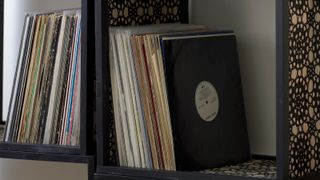
Vinyl (or to give it its proper name, polyvinyl chloride aka PVC) doesn't cope well with extreme heat. It can start to warp at temperatures above 60C (140F), so it's vital you keep your records in a suitably cool place. That means away from heaters, radiators and fires, and away from windows where the sun can heat them up in the warmer weather.
If you're storing them in an attic, bear in mind that heat rises so the top of your house can be the warmest place. If in doubt, it might be worth investing in a thermometer, or even better one with a hygrometer which measures moisture and humidity in your chosen storage room. You can pick up a hygrometer for less than a tenner, too.
Stay away from the light

Just to reiterate, sunlight is the enemy of not just vampires and goths, but vinyl records. The sun's UV rays can cause an LP's beautiful sleeve artwork to fade. Crate diggers might have noticed that those record fair or car boot sale prizes may have somewhat lost their looks due to the previous owners' lack of care around sunlight and bright rooms. So keep them shaded.
Carry on and keep calm
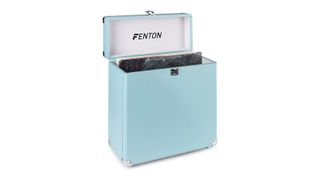
If you plan on DJing, or even if you're just taking your vinyl round a friend's house regularly, it makes sense to carry your vinyl in a sturdy, built-for-purpose record box. These can also look good in your music room, and may be just the ticket for smaller spaces where you might need to store your records under a desk, say. They will hold a fair few 12-inches. This one from Fenton looks the business and is solidly built, as this writer can attest, and holds up to 30 records.
Cut and dry

Most houses, particularly older buildings, can be prone to mould, mildew or excess condensation, and mould is very bad for your records. Aside from giving your records an unpleasant musty sort of smell, the mould can in the very worst cases creep into the grooves of a record. You can monitor levels of humidity using a hygrometer, to make sure that the part of the house in which you're storing them isn't too damp. The ideal humidity level is between 45 per cent and 55 per cent, just so you know.
Under pressure
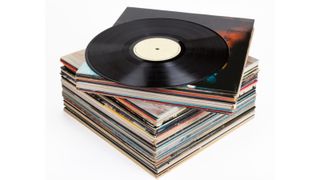
If you need to stash your collection in your attic or other storage while, say, you move house, store them as you would if they were on display – upright. They may not be on display, but don't just pile them flat on top of each other. Lots of records piled on top of one another will create a fair bit of pressure on those at the bottom – which over time can cause them to warp. Also, keep them close together and upright, rather than leaning them to avoid pressure in this way. If possible use dividers to separate the records, which will give the vinyl a little more room to breathe.
Plastic fantastic

We shouldn't have to tell you that investing in some plastic wallets will protect your precious vinyl, both in terms of the disc and the outer sleeve. They're relatively inexpensive and – while it might take you a few beats longer to put them away properly – will safeguard what is now a fair old investment in your favourite music format.
Divide and conquer

Especially for day-to-day use, dividers are a great idea for many reasons. If your vinyl albums don't have an outer plastic sleeve to protect them, thumbing through your collection from above or the sides (and let's face it, narrow album spines are hard to read) will inevitably wear on your beautiful cardboard sleeves. And you will thank yourself, if only for the time it will save you on said thumbing-through even a carefully alphabeticised collection.
Inner peace
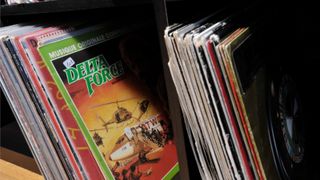
Make sure your records are put back properly in their inner sleeves. Even the standard paper inner sleeves will provide extra protection, but even those can scratch your vinyl; consider replacing them with plastic ones, which are better in that they tend to be anti-static – you can get a 50-pack of these for around £15. Sleeves made of polyethylene rather than PVC are also better in protecting the vinyl from UV rays.
Clean minds
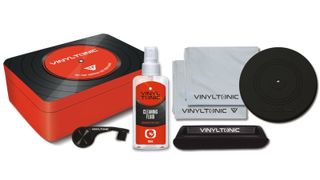
Always give your records a quick clean with a dedicated record cleaning cloth (or even a glasses cloth) before putting them away. This will prevent the build-up of dust, human and pet hairs (or god forbid, mould or mildew) which will eventually cause problems for playback. A good quality microfibre cloth, a bottle of cleaning solution and ideally an anti-static brush will be included in a record cleaning kit that can be had for around £20, and we would argue this is absolutely essential for record care.
MORE:
From voice to vinyl: how records get their groove
I would love to have a turntable system at home, but there are two things stopping me
